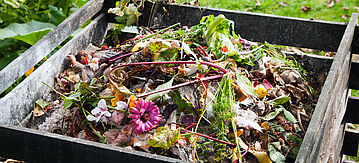Organic waste

In Germany, organic waste accounts for about 30 to 40 percent of municipal waste. Separately collected organic waste can be fermented in bio-gas installations. The gas generated can be used to produce electricity and heat or can be used as fuel. Composting separately collected organic waste generates compost that can be used as a fertiliser or soil improver. This compost can replace mineral fertilisers and peat and boost the share of humus in the soil. Recovering organic waste is therefore a sustainable way to manage raw materials that makes a key contribution to climate action and resource conservation.
To recover organic waste, a large number of local authorities have introduced a special bin for the separate collection of garden and food waste. You can read about the types of organic waste eligible for separate collection on the ministry website. Please note: local authorities and waste management companies decide which types of organic waste are collected in their areas.
Although separate collection of waste has been mandatory since 2015, significant amounts of organic waste are still disposed of as general waste, and are thus lost to high-quality recovery. Separately collected organic waste also often contains high levels of contaminants.
To further improve separate waste collection, the German Environment Agency conducted a research project on behalf of the Federal Environment Ministry examining the effectiveness of advice on waste separation, spot-check and sanction mechanisms and other methods to increase the quantity, share and unmixed quality of separately collected organic waste in various municipal structures.
A guideline was also developed based on the research. The guideline is intended to support public waste management authorities and companies in waste management as well as other institutions and interested members of the public with implementing and improving separate collection of organic waste.
In 2012, the environmental benefit of soil-related recovery of organic waste was examined in an environmental footprint analysis.
When unmixed organic waste is collected in a separate bin, composts from the waste contain 95 percent fewer contaminants than composts produced from mixed household waste.
When organic waste bins are used properly, there are no issues with odours or flies and maggots, even in summer. Waste management workers are not subject to higher health risks due to organic waste.
